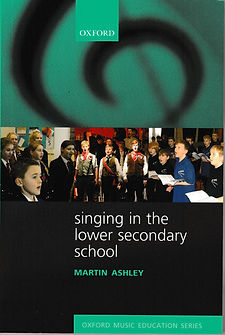
Publications
Books


Dead Composers and Living Boys: how high should boys sing in a digital age?
Peer reviewed papers and chapters on boys' singing
That was a fail Boy choristers and vocal agency during adolescent voice change. Preprint
Doing Voice My Way: renegotiating male vocal identity at adolescence. Routledge Companion to Vocal and Identity. Forthcoming.
Boys Can't Sing that Good: Perceptual judgments of vocal identity by the peer groups of accomplished boy singers. Updated reprint from 2008 monograph.
Trends in young male puberty and the changing voice: new dilemmas for choir directors. Choral Journal , August 2021.
Sweet boys singing and rude boys rampaging: Revisiting Boys Keep Singing during an era of rising inequality and declining opportunity. Sage Preprint.
First Choirs Standing: What risks were taken by choirs returning early to singing during the 2020 Covid pandemic, how were the risks managed and what were the outcomes?. Preprint available here
Where have all the singers gone? and when will they return? Prospects for choral singing after the SARS-CoV-2 pandemic, ABCD Choral Research Journal, Vol. 1 supplement.
Pitch, pedagogy and performance: demographic structure and vocal blending in an English cathedral boys' choir, ABCD Choral Research Journal, 1: 49 - 59
What Voices Have Emerged? Lessons on boys' vocal dispositions and choral tone from a new choral leaflet series Music Education Research. 10.1080/14613808.2018.1534819
Beautiful Swansongs of English Cathedral Music: adolescence and the boy "treble" voice. NATS Journal of Singing, 75 (2), 141 - 153.
To make again sweete musicke with the fearest voyces of England. ABCD Yearbook, 2018, 34-37.
The English choral tradition and the secular trend in pubertal timing, International Journal of Research in Choral Singing. 4 (2), 4 – 27.
1000 Years and 1000 Boys’ Voices: the crisis and radical challenge for boys’ singing, in U. Geisler and K. Johansson (eds), Choral Singing: histories and practices. Cambridge: Cambridge Scholars Publishing.
Broken voices or a broken curriculum? the impact of research on UK school choral practice with boys. British Journal of Music Education, 30 (3), 311 – 327.
With Mecke A-C “Boyes are apt to change their voice at about fourteene yeeres of age”: an historical background to the debate about longevity in boy treble singers. Research Reviews in Human Learning and Music, 1, 1 – 19.
The Angel Enigma: experienced boy singers’ perceptual judgements of changing voices. Music Education Research 13 (3), 343 -354.
Should I be singing this and if so, how high? boys reveal their masculinities, In J. Adams, M. Cochrane & l. Dunne (eds) The Application of Theory to Educational Research. Chichester: Wiley-Blackwell.
The perpetuation of hegemonic male power and the loss of boyhood innocence: case studies from the music industry. Journal of Youth Studies 14 (1), 59 – 76.
Technique or Testosterone? An empirical report on changes in the longevity of boy singers. , NATS Journal of Singing November/December, 137 – 145 . Access via Questia.
Slappers who gouge your eyes: Vocal performance as exemplification of disturbing inertia in gender equality, Gender and Education, 22 (1), 47-62.
“Real boys” don’t sing, but real boys do: the challenge of constructing and communicating acceptable boyhood, THYMOS Journal of Boyhood Studies, 4 (1), 54 – 69. Visit archive
Boyhood melancholia and the vocal projection of masculinity, THYMOS: Journal of Boyhood Studies, 2 (1), 26 – 35. Visit archive
You sing like a girl? An exploration of boyness through the treble voice, Sex Education: sexuality, society and learning, 6 (2), 193 -205. Visit archive
The spiritual, the cultural and the religious: What can we learn from a study of boy choristers?, International Journal of Children’s Spirituality, 7 (3), 257 -272.
Singing, gender and health: Perspectives from boys singing in a church choir, Health Education, 102 (4), 180 -187.
videos, podcasts, and recordings
Harry and the Who

What is an emerging voice?

With Cormac Thompson


Four video/podcasts based on Dead Composers and Living Boys are available here. They cover the main stages of Voice Change as identified by John Cooksey.
Click here for the growing collection of Videocasts of chapters from Dead Composers and Living Boys.
Contemporary Choral Work Interludes
Contemporary Choral Work with Boys contained some "interludes" - extended case studies of boys in between chapters. Two of the boys, both choristers, are now young adults. Short video documentaries were produced when they were in their mid-teens, some time after their voices have changed. Both films are remarkable for what they say about the years immediately after voice change. The young men have moved on, forgotten their treble voices, and are incredulous of their former selves.
CCWB Interlude 1 Max
William Web Version
The original NYCGB Widening participation project with David Howard and Jenevora Williams was issued as a free DVD to schools. Some of the films are now dated, but a selection of those still relevant can be viewed below.
Click this link or the DVD cover to go to the Boys Keep Singing legacy site.








